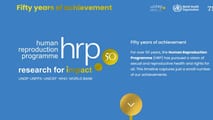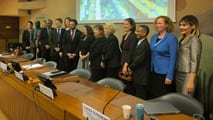The four ECHR Christian cases versus the United-Kingdom to be issued on 15 January 2013
Strasbourg. January 8, 2013.
On Tuesday 15 January 2013, the European Court of Human Rights will issue its ruling in the four cases of Nadia Eweida, Shirley Chaplin, Lillian Ladele and Gary McFarlane against the United-Kingdom, concerning the right of Christians not to be discriminated against at work because of their religion (cases nos. 48420/10, 59842/10, 51671/10 and 36516/10).
In those four cases, Christian employees from various denominations have been sanctioned by their employer, and even lost their job, for respecting the commitments of their faith and conscience: wearing a small cross on a chain around their neck (cases of Eweida and Chaplin), and refusing to register same-sex partnership (case of Ms Ladele). For the case of McFarlane, a marriage counsellor, he was dismissed after sharing with his superiors his moral doubts as to his personal ability to counsel same-sex couples. (Summary of the facts of the cases below)
The Court held a hearing in those cases on 4 September 2012. During this hearing, while the four applicants asked for respect for their freedom of religion and conscience and for the right not to be discriminated against because of their faith, the responding Government replied with the ultimate argument that their freedom of religion is respected because they are free to resign and to practice their religion in private. Such an argument is unrealistic because the applicants were not “free” to resign, as they have in fact already been fired. More deeply, this argument is a clear denial of the social dimension of religion and a manifestation of the liberticidal trend to transform freedom of religion into a mere freedom of worship (a freedom to have and practice a religion in private, behind “closed doors”). The extent of religion is limited to worship. This relapse of religious freedom to a freedom to worship is a step back to the level of freedom afforded to religious minorities in countries, such as Islamic and Communist countries, where Christians are only permitted to worship in private and where anti-Christian propaganda is free in public. Such “freedom of worship” do not allow people to behave publicly differently because of their religion and according to their conscience.
In fact, freedom of worship is just one component of the freedom of religion which, more broadly, provides that “Everyone has the right to freedom of thought, conscience and religion; this right includes freedom to change his religion or belief and freedom, either alone or in community with others and in public or private, to manifest his religion or belief, in worship, teaching, practice and observance” (article 9 of the ECHR).
The ECLJ intervened as a third party (amicus curiae) in the proceedings before the ECHR in two of the cases, namely in Ladele v. the United Kingdom (no. 51671/10) and McFarlane v. the United Kingdom (no. 36516/10) and submitted written observations to the Court . The Director of the ECLJ, Dr Grégor Puppinck, participated also at the hearing as adviser of Ms Nadia Eweida.
Summary of the facts of the cases:
Chaplin and Eweida (applications nos. 59842/10 and 48420/10)
The applicants, Ms Nadia Eweida and Ms Shirley Chaplin worked from 1999 and April 1989 respectively as a member of check-in staff for British Airways (BA) and as a nurse on a geriatrics ward being employed by the Royal Devon and Exeter NHS Foundation Trust. As a sign of their commitment to their faith, they wore a small silver cross on a chain around their neck openly.In September 2006, Ms Eweida was sent home without pay until she decided to comply with the uniform code, which, according to BA permits wearing a sikh turban or a muslim headscarf, but not a Christian Cross. In October 2006 she was offered administrative work without the obligation to wear a uniform or have contact with customers, which she refused. She finally returned to work in February 2007 when the company’s policy was changed to permit the display of religious and charity symbols, with the cross and the star of David being given immediate authorization.
As to Ms Chaplin, in June 2007, her manager asked her to remove her small crucifix on the chain around her neck. She sought approval to continue wearing her crucifix which was refused on the ground that it could cause injury if a patient pulled on it. In November 2009 she was moved to a non-nursing temporary position which ceased to exist in July 2010.
Both applicants lodged claims with the internal courts complaining in particular of discrimination on religious grounds, but their claims were rejected. In Ms Eweida’s case, they found that the visible wearing of a cross was not a requirement of the Christian faith but the applicant’s personal choice and that she had failed to establish that British Airways’ uniform policy had put Christians in general at a disadvantage.
Ladele and McFarlane (applications nos. 51671/10 and 36516/10)
The applicants, Ms Lilian Ladele and Mr Gary McFarlane were employed as a Registrar by the London Borough of Islington from 1992 to 2009 and as a Counselor for Relate from May 2003 to March 2008 respectively. Both of them consider that homosexual relationships are contrary to God’s law and that it is incompatible with their judgment and beliefs to do anything to condone homosexuality. When the Civil Partnership Act came into force in the United Kingdom in December 2005, the first applicant was informed by her employer that she would hence forth be required to officiate civil partnership ceremonies between homosexual couples. Refusing to sign an amended work contract, disciplinary proceedings were brought against her in May 2007 which concluded that, if she failed to include civil partnership ceremonies as part of her duties, she would be in breach of Islington Council’s equality and diversity policy and her contract could be terminated.
In the case of Mr McFarlane, by the end of 2007, his superiors, as well as other therapists, had expressed concern that there was conflict between his religious beliefs and his work with same-sex couples. In March 2008, after a disciplinary investigation, Mr McFarlane was dismissed summarily for gross misconduct on the ground that he had stated that he would comply with Relate’s Equal Opportunities Policies and provide counseling to same-sex couples without any intention of doing so. Both applicants brought proceedings before the internal tribunals on grounds of religious discrimination, but their claims were rejected on the grounds that their employers were not only entitled to require them to carry out their duties, but also to refuse to accommodate views which contradicted their fundamental declared principles.
Considering that their rights guaranteed by the Articles 9 (freedom of religion) and 14 (prohibition of discrimination) of the European Convention on Human Rights were violated, all four applicants addressed to the ECHR, complaining that domestic law failed to adequately protect their right to manifest their religion.
* * *
The European Centre for Law and Justice (ECLJ) is an international, Non-Governmental Organization dedicated to the promotion and protection of human rights. The ECLJ has held special Consultative Status before the United Nations/ECOSOC since 2007. The ECLJ advocates in particular the protection of religious freedoms and the dignity of the person with the European Court of Human Rights and the other mechanisms afforded by the United Nations, the Council of Europe, the European Parliament, and the Organization for Security and Cooperation in Europe (OSCE).
The ECLJ bases its action on “the spiritual and moral values which are the common heritage of [European] peoples and the true source of individual freedom, political liberty and the rule of law, principles which form the basis of all genuine democracy” (Preamble of the Statute of the Council of Europe).




.jpg)



